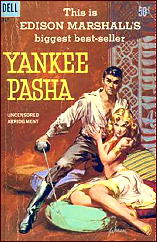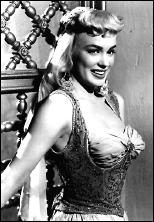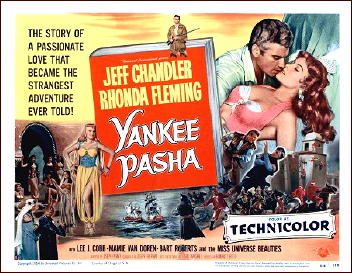Fri 12 Feb 2010
A Movie Review by David L. Vineyard: YANKEE PASHA (1954).
Posted by Steve under Action Adventure movies , Reviews[6] Comments
YANKEE PASHA. Universal International, 1954) Jeff Chandler, Rhonda Fleming, Mamie Van Doren, Lee J. Cobb, Bart Roberts (Rex Reason), Hal March, Tudor Owen, Benny Rubin, Harry Lauter. Based on the novel by Edison Marshall. Directed by Joseph Pevney.

Arabian Nights nonsense of a fairly high order based on Edison Marshall’s bestselling swashbuckling historical novel of the Barbary Coast and the adventures of an American frontiersman there.
Jeff Chandler, everybody’s favorite Jewish Apache, stars as Jason Starbuck, a frontiersman and trapper who wants to see the world and gets the chance when he falls for beautiful city girl Rhonda Fleming who is kidnapped by Barbary Pirates and sold into slavery as the property of the cruel head of the Sultan of Morocco’s Janissaries, Aga Omar (Bart Roberts).
Starbuck infiltrates the Sultan’s (Lee J. Cobb) army teaching his infantry frontier style shooting and quickly runs afoul of the cruel Aga who the Sultan fears and distrusts. He wins Fleming in a bet but is captured trying to escape with her, only to be rescued by Hassan (Hal March), the leader of the Sultan’s infantry who befriended him.
Chandler is stalwart, Fleming striking (and in at least one of the most revealing outfits of her long film career — body stocking or no), and Mamie Van Doren (below) supplies the comic relief as the slave girl presented to Starbuck and complicating his life and the plot.

That said, this is the kind of movie where a gaggle of Miss Universe contestants appear as slave girls offered by a drooling slave dealer.
All in all, a pale shadow of Marshall’s full blooded novel, but good fun and diverting with Chandler buckling a swash and Roberts meeting his well deserved end on the razor sharp hooks meant for those who violate the harem.
Cobb seems to have a little fun as the Sultan and you may even manage to forget March as the glad-handing playboy and huckster from television if you are old enough to remember him in the first place.
Marshall was better served by films like Son of Fury, Treasure of the Condor (both based on Benjamin Blake), and The Vikings, but Pevney is an old hand and skillful if yeoman direction gorgeous color, and bright costumes on beautiful women all add to the fun.
Yankee Pasha is an entertaining entry in a once familiar genre from an era when names like Baghdad, Morocco, and Arabia only brought thoughts of exotic adventure and wild vistas, and the only Marines involved were storming the shores of Tripoli to protect American ships from paying tribute to pirate kings — come to think of it, not all that different from today after all, only the spirit of fun and romance has been replaced with politics, oil, and all too real terrors and atrocities.
Editorial Comment: Yankee Pasha does not appear to be available on commerical DVD, but there are many collector-to-collector copies to be found on eBay, ioffer.com and the other usual sources. It was shown on AMC at some time in the past; a short clip of a terrific tussle between Mamie Van Doren and Rhonda Fleming can be found here on YouTube.

February 12th, 2010 at 7:08 am
No one evoked Arabia quite like Universal. From the Hall/Montez kitsch to Tony Curtis, their Middle East was a true never-never-land.
February 12th, 2010 at 9:33 am
Saw this one in the theater as a kid. I never missed one with those Arabian settings. I’ve never read the novel.
February 12th, 2010 at 1:20 pm
I’ve looked into Edison Marshall’s career a little. He’s one of those authors who were never recognized by literary critics, but whose books were enormously popular — only to become all but unknown again after his death.
As Steve Holland describes Charles Garvice, 1850-1920, Marshall seems to have been “the Dan Brown of his day.”
Who’s Charles Garvice?
Says Steve, “Charles Garvice was one of the most popular authors of his era—that era being roughly 1900-1920 … producing novels of no great literary value that went down a storm with the reading public. Most of them were romances, Garvice churning out dozens upon dozens of books, which had sold some six million copies worldwide by 1911.”
Read more: http://bearalley.blogspot.com/2010/02/charles-garvice.html
Returning to Edison Marshal, quoting from
http://www.allmovie.com/artist/edison-marshall-318224/bio :
“During the 1920s, he became one of the most successful authors of adventure short stories in America, developing a readership numbering in the millions in Harper’s Bazaar, Good Housekeeping, and Reader’s Digest — his stories were also published in book form, interspersed with the occasional longer piece of fiction.”
…
“In 1941, however, Marshall began a new phase of his career when he brought out his novel Benjamin Blake, a historical romance set in 18th century England. The story told of a young man’s stolen birthright and his battle to reclaim his heritage from an unscrupulous uncle — it was told in a vividly detailed, somewhat overheated fashion, with many lusty sexual impulses (for its time) ascribed to the hero and the villain alike. It was this element, along with a flowing style and vivid period detail, that helped turn the book into a huge success.”
…
“Marshall had found his niche and, over the next 20 years, wrote more than a dozen novels in a similar vein, telling of life and lusty adventure in bygone eras and faraway places. It was a winning formula, combining elements of potboiler and the pop history lesson with some mild titillation, and Marshall’s popularity soared — from the beginning of the 1940s through the start of the 1960s, he was one of the most reliable fixtures on popular book lists, appealing as much to men as to women.”
…
“During the 1960s, Marshall’s sales fell off as the public’s taste for his brand of fiction declined. Never taken too seriously by the critics, his passing was scarcely noticed by the literary community when he died in 1967, at the age of 73; but his books were sufficiently popular so that copies of Benjamin Blake remained fairly common in used book stores into the 1990s, four decades after its initial publication.”
This last sentence is misleading. The books were common in used bookstores because there were loads of them available, and no one wanted them. Trust me. Times had changed, tastes in fiction moved on quickly, and they most definitely did not sell.
Also, and I don’t know if you can make it out or not, but the cover of Yankee Pasha I used to illustrate David’s review says “uncensored abridgment.” I found that amusing.
— Steve
February 12th, 2010 at 1:27 pm
YANKEE PASHA was Edison Marshall’s biggest bestseller to that date and one of a string of novels that made him one of the kings of the historical novel beginning with BENJAMIN BLAKE and including YANKEE PASHA, CARAVAN TO XANADU (Marco Polo), EARTH GIANT (Hercules), PAGAN KING (Arthur), GYPSY SIXPENCE (Richard Burton), INFINITE WOMAN (Lola Montez), THE GREAT SMITH (John Smith), and THE VIKING.
His particular mix of sex, swashbuckling, and research proved highly popular and opened the door for writers such as Frank Yerby, Thomas Costain, Samuel Shellabarger, and Lawrence Schoonover among others.
Marshall began his career in the pulps (he was a regular in Argosy and All Story along with Edgar Rice Burroughs and Max Brand) writing westerns, north westerns, straight adventure (WHITE SAVAGE), fantasy (DIAN OF THE LOST CONTINENT)and graduated to the best seller list with BENJAMIN BLAKE SON OF FURY about a young man denied his proper birthright who swashbuckles his way from the streets of London to the New World and back in pursuit of his rightful heritage.
The book became a hit film as SON OF FURY with Tyrone Power, George Sanders, and Gene Tierney and was later remade in part as TREASURE OF THE CONDOR with Cornell Wilde. One bestseller after another followed: THE GENTLEMAN, CASTLE IN THE SWAMP, each featuring Marshall’s particular blend of sex and history until YANKEE PASHA became his greatest success and drove him to the very top.
Marshall’s books are still compellingly good reads today with a natural talent for capturing the voice and era he wrote about and constructing page turning plots filled with colorful characters, nasty villains, and magnificent women as well as historical accuracy. THE PAGAN KING is a fine Arthurian novel and the VIKING an outstanding tale of adventure (and not a bad film either as Richard Fleisher’s THE VIKINGS).
For the most part though Hollywood was too tame for Marshall’s ruthless heroes, passionate women, and blood thirsty bad guys and few films could do justice to his wide ranging and complex plots. INFINITE WOMAN told from the point of view and in the voice of a character based on Lola Montez is one of the best of his books and as readable today as when it was first published.
February 12th, 2010 at 2:33 pm
Hey, this makes me want to read the book. And MORE of Marshall’s books. Thanks.
February 14th, 2010 at 1:37 pm
Evan
I think you’ll like Marshall. He wrote big full blooded novels with larger than life heroes and heroines and a good eye for historical detail and capturing the eras he wrote about. His Pagan King is an outstanding Arthurian novel about a very likely Arhtur and I’ll stand it beside Rosemary Sutcliffe’s Sword of Sunset or Mary Stewart’s novels any day. Earth Giant is narrated by a believable Hercules, and The Viking is one of the most rousing adventures you will ever encounter.
I’ve always thought that Robert E. Howard might have ended up writing in the Marshall vein if he had lived longer, and Marshall offers some of the same word magic and spirit of Howard’s work or Harold Lamb before him.
Steve
Re that “uncensored abridgement” it mostly meant they left all the racy stuff in but cut the book a bit for length, though I’ve read the hardcover and paperback and don’t see that many cuts.
Marshall’s sales meant he did pretty well in terms of cover artists. Not only the one you show here, but also James Bama covers for Yankee Pasha and Caravan to Xanadu and others from Bob Abbett.
Other than Pagan King and Infinite Woman my favorite Marshall novel may be Gypsy Sixpence Marshall’s take on the life of Sir Richard Francis Burton. It’s an Errol Flynn movie in print.